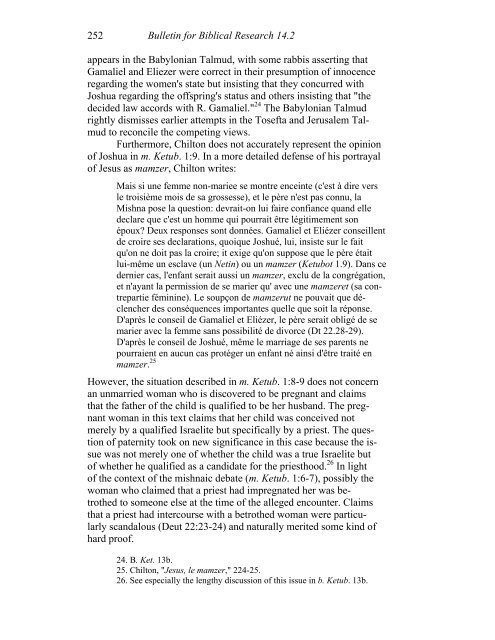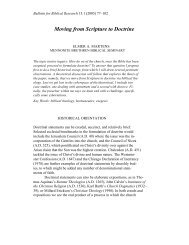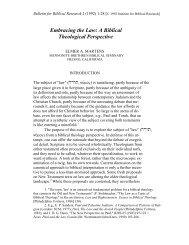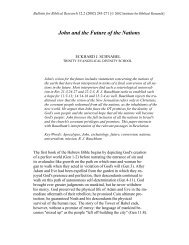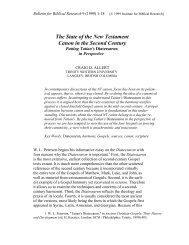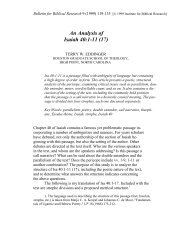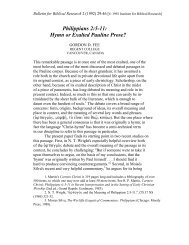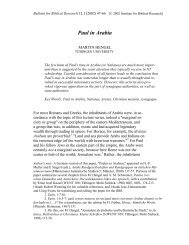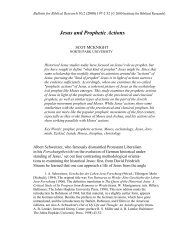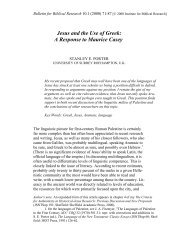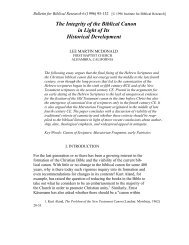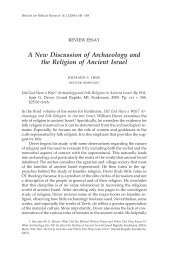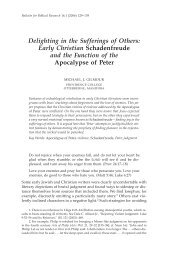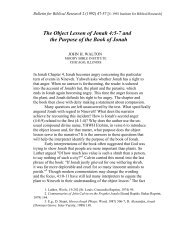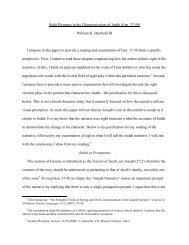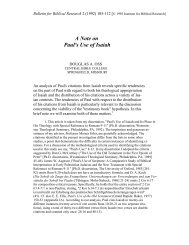Jesus as Mamzer - Institute for Biblical Research
Jesus as Mamzer - Institute for Biblical Research
Jesus as Mamzer - Institute for Biblical Research
Create successful ePaper yourself
Turn your PDF publications into a flip-book with our unique Google optimized e-Paper software.
252 Bulletin <strong>for</strong> <strong>Biblical</strong> <strong>Research</strong> 14.2<br />
appears in the Babylonian Talmud, with some rabbis <strong>as</strong>serting that<br />
Gamaliel and Eliezer were correct in their presumption of innocence<br />
regarding the women's state but insisting that they concurred with<br />
Joshua regarding the offspring's status and others insisting that "the<br />
decided law accords with R. Gamaliel." 24 The Babylonian Talmud<br />
rightly dismisses earlier attempts in the Tosefta and Jerusalem Talmud<br />
to reconcile the competing views.<br />
Furthermore, Chilton does not accurately represent the opinion<br />
of Joshua in m. Ketub. 1:9. In a more detailed defense of his portrayal<br />
of <strong>Jesus</strong> <strong>as</strong> mamzer, Chilton writes:<br />
Mais si une femme non-mariee se montre enceinte (c'est à dire vers<br />
le troisième mois de sa grossesse), et le père n'est p<strong>as</strong> connu, la<br />
Mishna pose la question: devrait-on lui faire confiance quand elle<br />
declare que c'est un homme qui pourrait être légitimement son<br />
époux? Deux responses sont données. Gamaliel et Eliézer conseillent<br />
de croire ses declarations, quoique Joshué, lui, insiste sur le fait<br />
qu'on ne doit p<strong>as</strong> la croire; it exige qu'on suppose que le père était<br />
lui-même un esclave (un Netin) ou un mamzer (Ketubot 1.9). Dans ce<br />
dernier c<strong>as</strong>, l'enfant serait aussi un mamzer, exclu de la congrégation,<br />
et n'ayant la permission de se marier qu' avec une mamzeret (sa contrepartie<br />
féminine). Le soupçon de mamzerut ne pouvait que déclencher<br />
des conséquences importantes quelle que soit la réponse.<br />
D'après le conseil de Gamaliel et Eliézer, le père serait obligé de se<br />
marier avec la femme sans possibilité de divorce (Dt 22.28-29).<br />
D'après le conseil de Joshué, même le marriage de ses parents ne<br />
pourraient en aucun c<strong>as</strong> protéger un enfant né ainsi d'être traité en<br />
mamzer. 25<br />
However, the situation described in m. Ketub. 1:8-9 does not concern<br />
an unmarried woman who is discovered to be pregnant and claims<br />
that the father of the child is qualified to be her husband. The pregnant<br />
woman in this text claims that her child w<strong>as</strong> conceived not<br />
merely by a qualified Israelite but specifically by a priest. The question<br />
of paternity took on new significance in this c<strong>as</strong>e because the issue<br />
w<strong>as</strong> not merely one of whether the child w<strong>as</strong> a true Israelite but<br />
of whether he qualified <strong>as</strong> a candidate <strong>for</strong> the priesthood. 26 In light<br />
of the context of the mishnaic debate (m. Ketub. 1:6-7), possibly the<br />
woman who claimed that a priest had impregnated her w<strong>as</strong> betrothed<br />
to someone else at the time of the alleged encounter. Claims<br />
that a priest had intercourse with a betrothed woman were particularly<br />
scandalous (Deut 22:23-24) and naturally merited some kind of<br />
hard proof.<br />
24. B. Ket. 13b.<br />
25. Chilton, "<strong>Jesus</strong>, le mamzer," 224-25.<br />
26. See especially the lengthy discussion of this issue in b. Ketub. 13b.


